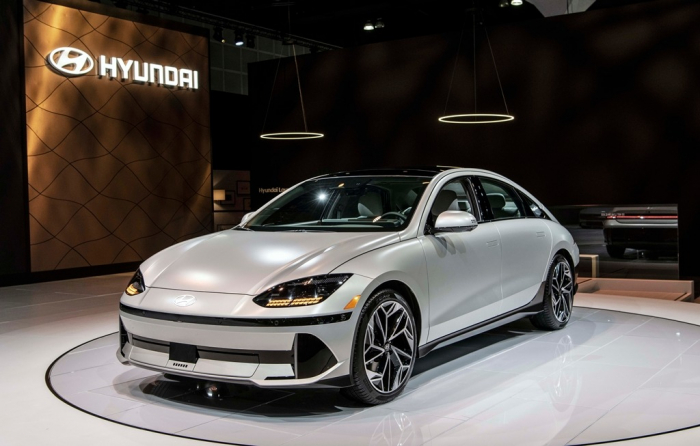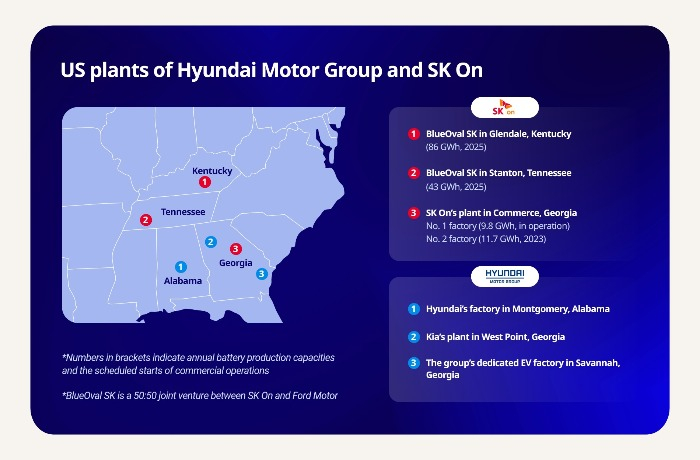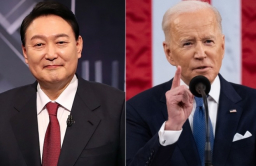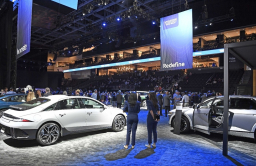-
KOSPI 2577.27 -2.21 -0.09%
-
KOSDAQ 722.52 -7.07 -0.97%
-
KOSPI200 341.49 +0.02 +0.01%
-
USD/KRW 1396 -2.00 0.14%
Hyundai ties up with LG, SK for $5.3 bn US EV cell plants
Electric vehicles
Hyundai ties up with LG, SK for $5.3 bn US EV cell plants
Hyundai Motor Group to set to build 2 joint battery plants with LG Energy for US sales target of more than 1 million EVs in 2030
By
Apr 21, 2023 (Gmt+09:00)
2
Min read
News+

Hyundai Motor Group, the leading South Korean automaker, has joined hands with LG Energy Solution Ltd. and its smaller rival SK On Co. to build electric vehicle battery plants with investments totaling 7 trillion won ($5.3 billion) in the US to expand their position in the world’s No. 3 EV market by utilizing Washington’s tax credits.
The group of Hyundai Motor Co. and Kia Corp. plans to spend 4 trillion won on a joint battery plant with LG Energy, the world’s second-largest cell maker, to produce 35-gigawatt-hour (GWh) capacity of batteries a year, according to industry sources in Seoul on Friday.
The factory is set to supply the batteries, which would be enough for 400,000 EVs, to Hyundai’s existing car plant in Montgomery, Alabama, and Kia’s factory in West Point, Georgia.
With SK On, the world’s No. 5 EV battery maker, the South Korean conglomerate is also set to invest 3 trillion won in a plant with an annual capacity of 25 GWh.
The facility scheduled to start commercial operations in 2025 will provide cells for some 300,000 EVs to be manufactured at the group’s first dedicated EV facilities under construction in Savannah, Georgia. The group and SK On last November already agreed to set up a 50-50 joint venture for the plant.
TO SELL MORE THAN 1 MILLION EVS IN US IN 2030
The plans came as the US decided to provide tax credits of up to $7,500 per EV, which are assembled in North America. The government also requires that 50% of the value of battery components be produced or assembled in North America to qualify for a $3,750 subsidy. It also requires that 40% of the value of critical minerals be sourced from the US or a free trade partner for another $3,750 credit.

Hyundai and Kia aim to sell more than 500,000 EVs in 2026 and 1 million units of the eco-friendly automobiles in 2030 by transforming their existing plants, which can produce 360,000 vehicles a year each, into EV production lines.
For the goal, the group is considering another joint plant with LG Energy to produce 30 GWh of batteries a year.
Hyundai Motor Group is scheduled to hold a board of directors’ meeting on April 25 for those battery joint ventures, while SK On and LG Energy are set to hold such meetings for the plans on April 27 and in mid-May, respectively.
Those investment plans are likely to be decided next week when South Korean President Yoon Suk Yeol visits the US for a summit meeting with his US counterpart Joe Biden. South Korea’s business leaders including Hyundai Motor Group Chairman Chung Euisun are scheduled to join Yoon.
“The potential announcement of those plans is expected to strengthen cooperation between the two countries in high-tech industries such as mobility,” said an industry source.
Write to Il-Gue Kim and Hyung-Kyu Kim at black0419@hankyung.com
Jongwoo Cheon edited this article.
More To Read
-
 Business & PoliticsYoon’s US visit to test Biden’s trust as ally over chip, battery issues
Business & PoliticsYoon’s US visit to test Biden’s trust as ally over chip, battery issuesMar 08, 2023 (Gmt+09:00)
-
Nov 25, 2022 (Gmt+09:00)



